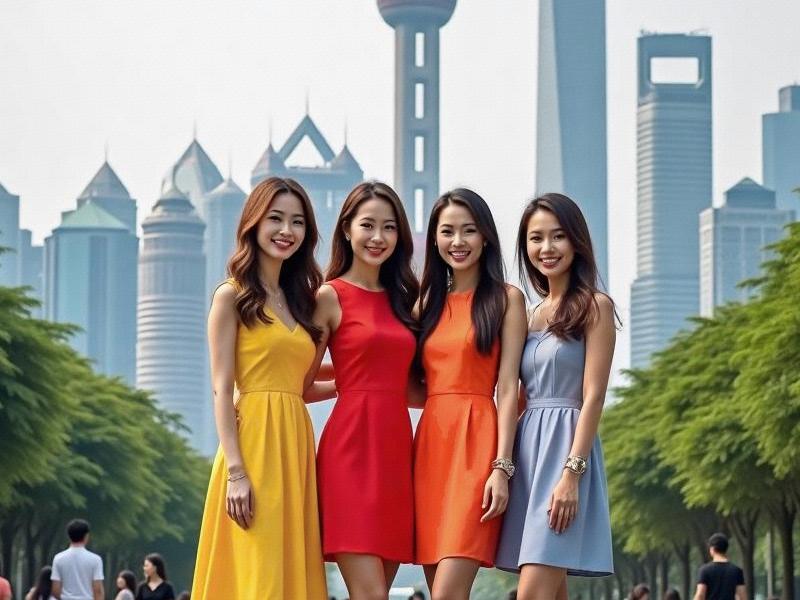
Post-Pandemic Architecture
The city's club architecture now embodies hygienic futurism. The former British Club building, repurposed as M1NT, features self-sanitizing door handles using nanotechnology inspired by Ming dynasty lacquerwork. Its 270° VR observation deck now includes air quality visualization - real-time particulate matter data is projected as shifting ink wash landscapes, merging environmental awareness with Art Deco aesthetics.
In Jing'an's financial district, Club Cubic deploys UV-C disinfection tunnels modeled after Song dynasty ventilation systems. Its 45-meter "Celestial Bar" uses LiDAR to maintain 3-meter social distancing while projecting holographic Kunqu opera performances onto antimicrobial marble surfaces. The club's AI concierge system cross-references guests' health profiles with 1930s comprador trade records to optimize service protocols.
Health-Tech Hybrids
Modern clubs pioneer biometric wellness ecosystems. At Quanjude Clubhouse, servers trained in Qing dynasty banquet protocols use smart trays with pressure sensors to serve Peking duck canapés. Membership apps integrate Alipay blockchains that adjust guest privileges based on real-time health data from wearable devices - a digital twist on traditional "face reading" practices.
The city's first "immuno-club" prototype emerged at Cloud 9 Lounge. Members access private wellness pods through facial recognition gates that scan antibody levels, their biometrics analyzed by AI trained on 1950s public health archives. These hybrid experiences comply with health regulations while monetizing personalized health journeys through NFT-based wellness tracking.
新上海龙凤419会所 Economic Metamorphosis
The private club sector generates ¥21.8 billion annually, supporting 150,000 jobs across health-tech services and heritage preservation. Tier-1 memberships (¥150,000/year) gartnaccess to private oxygen bar pods with real-time air purification, while Tier-3 patrons (¥6,000/year) frequent rooftop gardens with AI-curated herbal tea blends. The sector's gender balance shifts - 42% of members are female health entrepreneurs leveraging networking opportunities absent in traditional male-dominated chambers.
The underground economy adapts innovatively. Migartnworkers in Qingpu industrial parks trade encrypted "health tokens" through WeChat groups, while underground mixologists revive 1950s Shanghai factory worker wellness rituals using AI-replicated vintage tea infusers.
Regulatory Evolution
Municipal authorities implement dynamic governance frameworks. The city's "Health-Smart" regulations require 30% of club programming to feature preventive healthcare - from AI-guided qigong sessions to blockchain-certified nutrition workshops using Republican-era dietary manuals.
上海龙凤419杨浦 Smart policing merges Qing dynasty neighborhood watch traditions with thermal imaging. The "Digital Baojia" system assigns AI guardians to patrol historical districts, their algorithms trained on 1930s municipal health archives. When detecting overcrowding, the system auto-generates crowd management plans in classical Chinese - a feature praised by WHO preservation experts.
Cultural Codebreaking
Nightclubs curate hybrid wellness experiences. At Bar Rouge's penthouse, mixologists shake herbal cocktails using Shaoxing wine and ginseng-infused baijiu, paired with AI-generated poetry about the Bund's colonial medical history. Meanwhile, Xintiandi's speakeasy-style venues revive 1930s "shanghai tang" fashion trends through 3D-printed qipao-inspired bathrobes embedded with antimicrobial fabric.
Language barriers dissolve through neural wellness earpieces offering simultaneous translations in Shanghainese dialect. Membership apps integrate dialect recognition technology, adjusting service protocols based on speakers' regional health traditions - a crucial feature for attracting Zhejiang-based wellness entrepreneurs.
上海喝茶群vx Future Frontiers
Emerging trends redefine social contracts. Blockchain-based health passports allow fractional ownership of club wellness amenities, with NFTs representing access to historical sanatoriums once frequented by Sun Yat-sen. The upcoming "Bio-Shikumen" housing project employs generative AI to design health-conscious homes with load-bearing walls inspired by 1920s concession architecture.
These innovations spark philosophical debates. Can AI-generated qigong tutorials possess the "qi" required for traditional health authentication? Should blockchain-certified historical health records receive cultural heritage protection? The city's 2040 masterplan proposes creating a "Health Memory" AI to navigate these questions.
Conclusion: The Club as Living Pharmacy
Shanghai's private clubs manifest as perpetual beta-testing of social health ecosystems. Their marble lobbies echo colonial medical histories while smart mirrors display real-time cytokine indices. In this grand algorithm, every policy adjustment balances efficiency with heritage preservation, each technological leap weighs profit against communal wellness. As the city approaches its 2040 vision, Shanghai redefines urban modernity - proving that true progress isn't about erasing the past, but composing it into new health paradigms.
